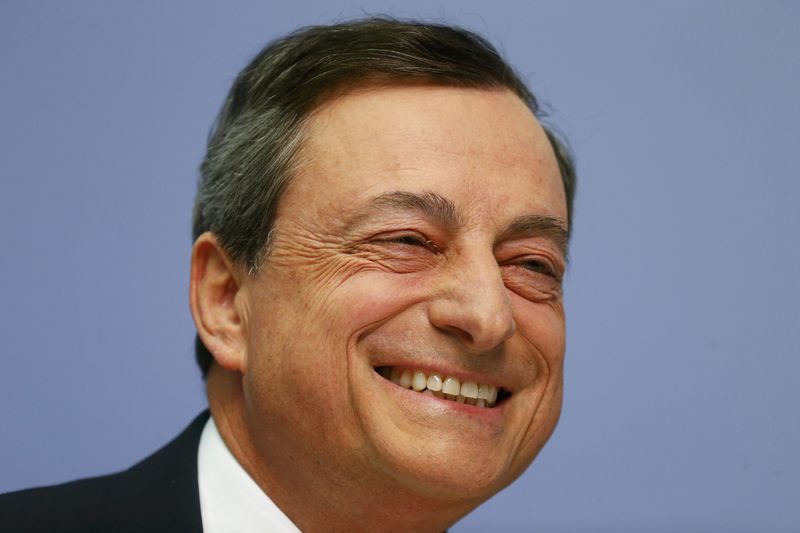Investing.com - European Central Bank President Mario Draghi pulled off another rhetorical balancing act Thursday, talking the euro back down after his fellow policymakers signaled they wouldn’t cut interest rates for the next year, despite the growing risks to the economy from a U.S.-China trade war.
At his regular press conference following the ECB’s governing council meeting, Draghi – with little prompting – volunteered that some of his colleagues had argued for a resumption of quantitative easing, arguably the most powerful tool in the central bank armory at present.
The mere mention of it was enough to immediately turn around a nascent euro rally and an accompanying selloff in government bonds. The euro, which had risen three-quarters of a cent on the back of the ECB’s policy decisions, gave up half of those gains and was back at $1.1261 by 10:10 AM ET (14:10 GMT).
“Draghi is not done yet,” Nordea Chief Strategist Jan von Gerich said in a note. “While the ECB took another small step towards exiting ultra-easy monetary policy measures today, the press conference was all about being ready to act with further rate cuts and more asset purchases, if needed.”
Despite making only marginal tweaks to its forecasts for growth and inflation over the next two years, the council had earlier voted unanimously to push back to the middle of 2020 the date when it will start to consider raising interest rates. The new stance means that whoever replaces Draghi in November will find it near impossible to move the bank's interest rates for at least eight months.
It was the second-straight meeting that the ECB has extended the timeframe for its first hike since 2011. At its last meeting, it had pushed out the timing from September to the end of 2019.
Draghi said there was still “confidence in the baseline, but a clear acknowledgement of the risks” to the region – risks that he said were still tilted to the downside thanks to the escalating trade dispute between the U.S. on the one side and China and Mexico on the other.
"Political risk has become the main driver of the international monetary cycle,” said Lena Komileva, chief executive of G+ economics. The central banks of Australia and India have both cut interest rates this week under the same baleful influence of the U.S.-China dispute.
Fed Chairman Jerome Powell had also said earlier this week that he would act to “sustain the expansion” if need be, departing from previous language indicating that he was against any near-term change to interest rates.
Against that backdrop, it was perhaps a surprise that the ECB chose not to reintroduce the possibility of another interest rate cut into its own guidance. As such, the euro's interest rate differential with the dollar will likely narrow in the future, given that the Federal Reserve appears to be pivoting to a looser policy stance.
The biggest news for markets is not that the ECB won't hike, but that the ECB won't cut rates over the next 12 months," said Pictet Asset Management economist Frederik Ducrozet via Twitter.
In addition, the bank said it would price its new round of “Targeted Long-Term Refinancing Operations”, or TLTROs, beginning in September, at as little as 10 basis points over its deposit rate, which is currently at -0.40%. The precise rate will vary, depending on how much banks lend on to companies and households.
Draghi styled the pricing as more of a “backstop” against any unwanted tightening of financial conditions as new standards on bank liquidity come into force, rather than an easing of policy in itself. He noted that the council wanted to avoid encouraging carry trades, where banks borrow at ultra-cheap rates only to throw the money at their respective government bond market.
As expected, the ECB left its official interest rates all unchanged. The deposit rate has been at -0.4% and the key refinancing rate has been at 0% since March 2016.
